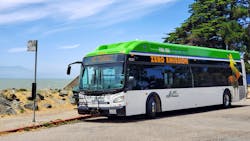Partnerships, state funding help Humboldt Transit Authority deliver on vision for more sustainable fleet
Humboldt Transit Authority (HTA) is set to deploy 11 New Flyer fuel cell electric buses and a hydrogen fueling station at its Eureka, Calif., facility with a $38.7 million grant from the California State Transportation Agency’s Transit and Intercity Rail Capital Program.
The Center for Transportation and the Environment (CTE) played a key role in field demonstration to determine range and operating capability, assisted in grant writing and will continue to serve as a subcontractor to help ensure success and mitigate risks associated with HTA’s deployment.
Humboldt County currently operates a fleet of 53 buses, serving 600,000 riders a year. Replacing 11 diesel buses with hydrogen fuel cell electric buses will eliminate more than 120,000 gallons of diesel annually and expand intercity bus service between Eureka and Ukiah, which in turn improves the connection with Sonoma County’s SMART Train and fills service gaps left by Amtrak and Greyhound.
Founding director of the Schatz Energy Research Center (SERC) at Cal Poly Humboldt Peter Lehman and SERC staff led the effort to prepare HTA’s application for the $38.7 million grant, with assistance from CTE.
“We’re delighted to be teaming with HTA, CTE and other project partners on this pioneering project,” Lehman said. “The Schatz Center has been working on hydrogen technology for over 30 years—first with SunLine Transit in Southern California and then with AC Transit in the Bay Area. Now, we’re bringing the technology home. Introducing zero-emission buses and hydrogen fueling infrastructure here in Humboldt County is a dream come true.”
The future of the North Coast requires significantly expanding transit services to meet its citizens’ needs. To meet those needs equitably, this project will serve numerous census tracts with multiple population-characteristic burdens that are higher than the state median, including very high poverty, unemployment and housing burden scores.
Climate change impacts are also a major concern in the region, from wildfires to sea level rise around Humboldt Bay, where many of the North Coast’s citizens live. This project will enable HTA to take aggressive action to mitigate these impacts by beginning to transition their fleet to zero-emission buses and catalyzing the development of hydrogen fueling infrastructure in the area.
In addition to enhancing transit connectivity through Northern California, this project includes the construction of an intermodal transit and housing facility in downtown Eureka. The Eureka Regional Transit and Housing Center—EaRTH Center— will integrate local and intercity bus service with carshare, rideshare, bicycle paths and pedestrian travel as well as provide workforce and student housing, a childcare center, retail and open space co-located with transit at the center.
“We’re thrilled to have the expertise and supporting services of CTE to help us introduce clean, zero-emission hydrogen buses to serve our transit riders here on the North Coast,” said HTA General Manager Greg Pratt. “With these new buses, we’ll also be introducing a new intercity route connecting Humboldt riders to Ukiah, the SMART train and points south. And together with the attractive EaRTH Center planned for downtown Eureka, we’ll be improving essential transit services locally and supporting the city’s goals of sustainable growth and equitable access to housing.”
